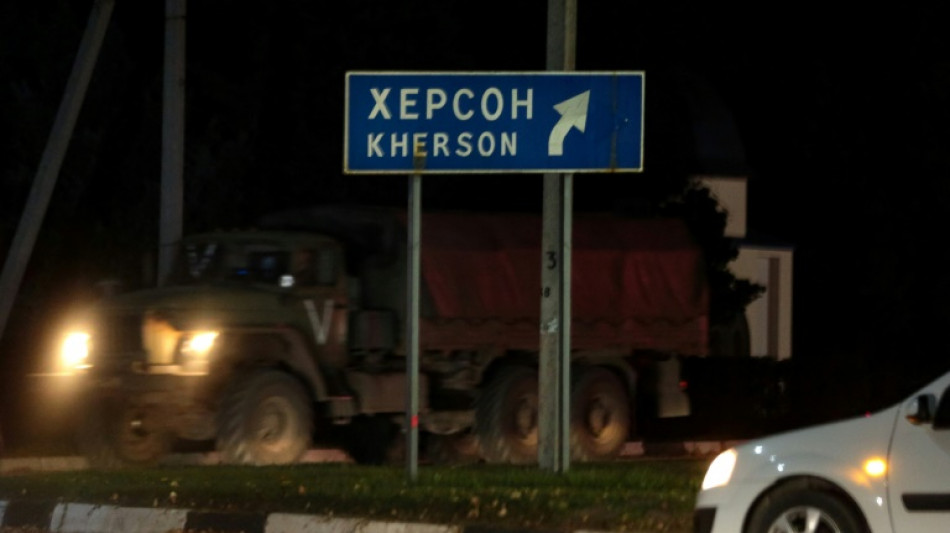

As Ukrainians advance, Russians risk losing prized Kherson city
Advancing Ukrainians have vowed to wrest back the southern city of Kherson from the Russians but analysts say Moscow may be reluctant to give up one of its biggest trophies since the February invasion.
On March 3, barely a week into the cross-border assault, Russian troops captured Kherson, the regional centre of the southern Ukrainian province of the same name.
It was the first major city to fall to Moscow's forces, providing them with a bridgehead on the western banks of the Dnipro river from which Russian troops could launch attacks for more territory further west.
"It's a strategic point. It's a connexion point between the Dnipro and the rest of the country," said Olga Chiriac, a researcher at the Middle East Institute.
But today a Ukrainian counteroffensive is creeping closer to the city, threatening to deprive Moscow of the only provincial capital it has occupied in the invasion.
Pro-Russian authorities in the city have ordered residents to evacuate. And on Friday they accused Kyiv's forces of killing four people when they shelled a bridge linking both sides of the river, though a Ukrainian military spokeswoman denied that they had killed any civilians.
Ukrainian President Volodymyr Zelensky has in turn accused Russia of planning to destroy a hydroelectric dam upstream from the city, in what would amount to a "catastrophe on a grand scale".
He said hundreds of thousands of people around the Dnipro would be in danger of flash flooding.
And cutting water supplies could also impact the cooling systems of the Zaporizhzhia nuclear power plant, Europe's largest.
- Russians 'at a dead end' -
It is not yet clear whether the Russians will hold on to Kherson or retreat eastwards across the river.
For the moment, Russia controls a strip around 140 kilometres (90 miles) long along the western bank of the Dnipro river.
It has bolstered its presence with a huge number of seasoned soldiers, who would have the advantage and be able to inflict terrible losses if the Ukrainians decided to attack the city.
But with a river within Ukrainian artillery range separating the Russians from their fall-back positions, they also risk being encircled.
In short, said former Romanian military intelligence officer Valentin Mateiu, Russia had troops that were competent "but at a dead end".
Its forces were at a "strategic disadvantage", after Ukrainian soldiers managed to seize their own foothold beyond a Dnipro tributary to the north of the city, from which they might cut off Russian-held territory.
Ukrainians earlier in the war "systematically prepared the battlefield", destroying bridges and command centres for example, he said, and could likely do the same again.
He and Chiriac nevertheless thought the Russians would do their best to hold on to the city.
"The Russians will try to avoid being encircled and turn Kherson into a centre of resistance," Mateiu said.
- 'Risk a new Mariupol'? -
Ukrainian analyst Mykhailo Samus said Moscow's troops should have been evacuated "a long time ago".
But he thought it was unlikely that the Ukrainians would want to attack the Russian-held city, where tens of thousands of residents remain.
"The Ukrainians won't conduct any battle for Kherson. They don't attack and destroy cities like Russia, like Mariupol," he said, referring to the city pounded to rubble by the Russians earlier in the war.
Retired US general Ben Hodges agreed the Ukrainians were likely to avoid a "giant fight inside the city".
Instead, they are "keeping these Russian troops fixed there so that they cannot escape, and at some point... they'll be ready to bypass the Russians inside Kherson", he said.
Pierre Grasser, a researcher tied to Paris' Sorbonne University, said the Ukrainians were having to carefully weigh up their movements outside the city.
Any closer and "they will be entering the Kherson suburbs, and that could be dangerous", he said.
"Urban warfare always leads to many deaths on the attacker's side" and "it would risk a new Mariupol" in terms of damage.
Mateiu said the commander-in-chief of Ukraine's armed forces, Valeriy Zaluzhnyi, was facing a dilemma.
"The president wants this strategic victory", especially since it would pave the way towards retaking Ukraine's Crimea peninsula annexed by Russia in 2014, he said.
That leaves the army chief with what retired French general Michel Yakovleff described as a terrible choice -- "besiege (the city) for as long as it takes or annihilate it and reduce it to rubble".
P.Walsh--MP




